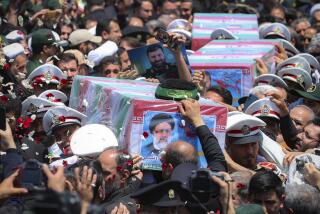Shrine Holds Great Significance for Shiites
- Share via
BAGHDAD — The attackers who bombed the Golden Mosque in Samarra ignited fury among Iraq’s Shiite majority by targeting one of the sect’s most revered shrines.
More so than Sunni Arabs, Shiites believe in the sanctity of shrines. Pious Shiites from Lebanon to India make pilgrimages to the shrines of the sect’s imams, and Shiite merchants bequeath their fortunes for the restoration and upkeep of shrines. The Samarra complex dates to the 9th century, although the famed gold dome was completed in 1905.
The revered status of the shrines comes from their connection to the imams, who are “part of the skeleton of the Shiite faith,” said Yitzhak Nakash, associate professor of Middle Eastern and Islamic Studies at Brandeis University, who has written about Shiites.
Shiites and Sunnis split early in the history of Islam, differing over succession after the death of the prophet Muhammad in the 7th century. The first three successors, or caliphs, were Muhammad’s associates, but Shiites rejected them, arguing that Ali, the prophet’s cousin and son-in-law, was the rightful heir.
Ali became the fourth caliph, but the conflict continued after his death. From then on, supporters, or Shia, of Ali, took a separate path, regarding him as their first imam and choosing successors from among his heirs.
One of Ali’s sons, Hasan, lost the struggle for caliphate and another, Hussein, was killed. According to Shiite belief, the caliphs were trying to wipe out Ali’s line of succession by killing off his heirs -- the imams -- one by one over the next few centuries.
The Samarra shrine is believed to house the remains of the ninth and 10th of Ali’s heirs, Ali Hadi and Hasan Askari. Shiites believe that both were poisoned in the 9th century by agents of the caliph.
But, many Shiites believe that Askari’s young son, Mohammed Mahdi, disappeared into a cellar near site of the shrine and was not killed, an event called the occultation.
They regard Mahdi as the 12th or “Hidden Imam,” and believe he will reappear, heralding a new age and avenging the wrongs done to Shiites by Sunni governments for centuries.
“Mahdi is expected to return one day as a messiah,” Nakash said. The shrine complex is considered a link to the Mahdi. As a result, the attack on it “is a very significant provocation.”
More to Read
Sign up for Essential California
The most important California stories and recommendations in your inbox every morning.
You may occasionally receive promotional content from the Los Angeles Times.













